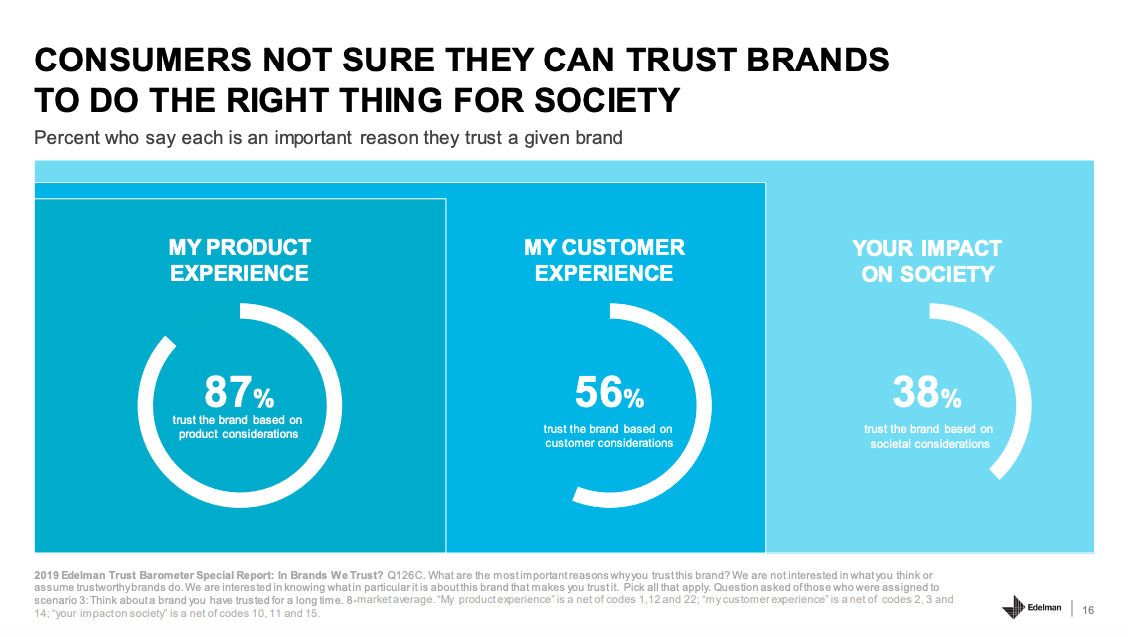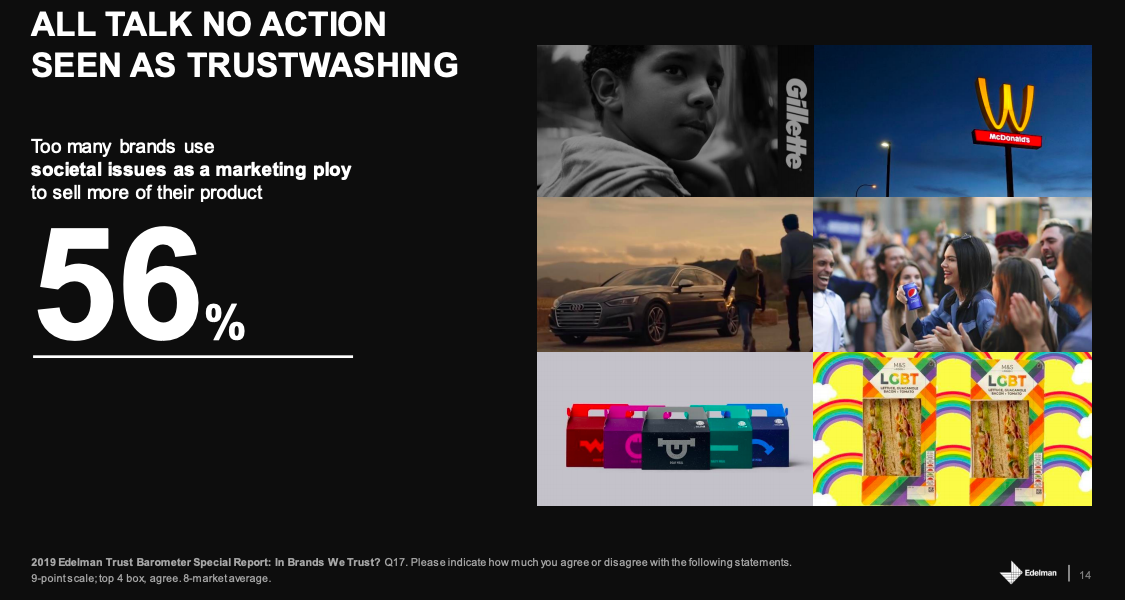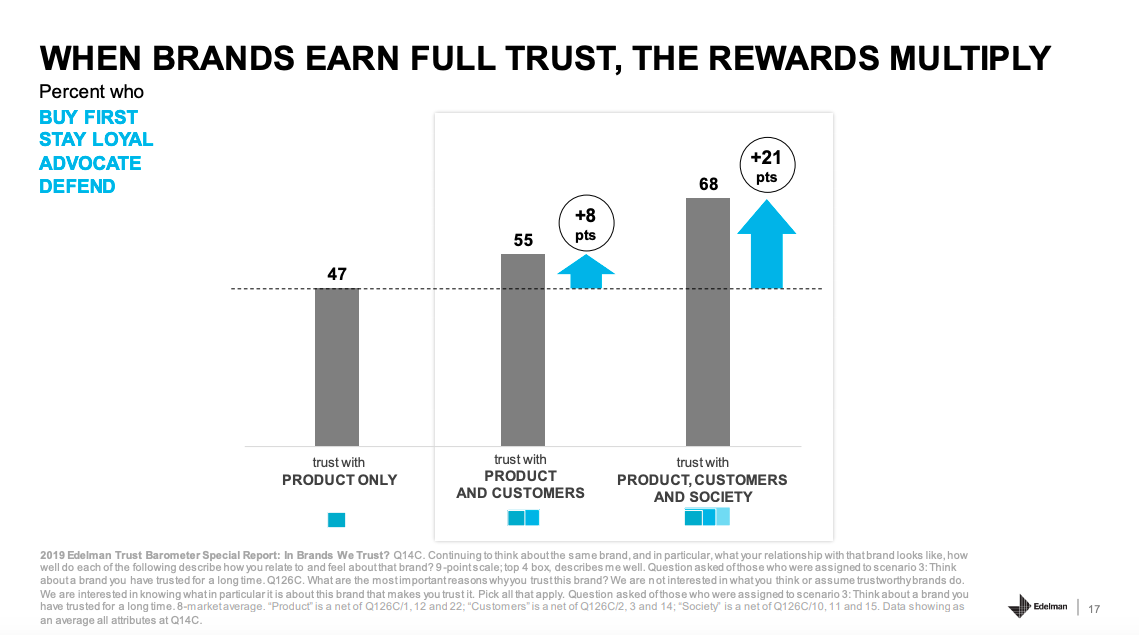Consumer trust can be the key to your brand’s success. It’s harder to convince people to trust your brand, especially when you’re not listening to your audience’s needs. Here’s how to build consumer trust.
It’s not easy nowadays to earn consumers’ trust as a brand. Many mistakes and failed campaigns have created a level of distrust that needs further effort to be improved.
It’s not impossible though to build trust with your consumers. All you need is the genuine interest in what your consumers expect from you. There are some steps you can follow to start building trust for your product, your brand, and your business.
Edelman has released a new “Trust Barometer Special Report” to help us find out what consumers think of brands and what they expect from them.
We are looking at the key steps that brands need to follow to earn trust along with the benefits of achieving it.
Trust is more important than ever

Consumers are interested in three main things when it comes to trusting a brand:
- Product experience
- Customer experience
- A brand’s impact on society
These three pillars define how much they can trust a brand to proceed to the next steps (sale, engagement, advocacy, etc)
There seem to be growing concerns about all the three pillars. More specifically,
- 62% of the respondents have growing concerns about product experience
- 55% of the respondents have growing concerns about customer experience
- 69% of the respondents have growing concerns about brands’ impact on society
Thus, a brand’s impact on society seems to be the most popular reason that consumers lose trust in a brand. Whether it’s the fact that a brand is silent over societal issues or they fail to address them in the most authentic way, it’s a deal breaker for (Read more...) who expect from brands to express their values.
Trust ranks as one of the top buying considerations

Whitepapers
Source: Edelman
It’s important to understand how consumers think so that your brand delivers more relevant messaging. Trust seems to be key and it’s actually one of the main reasons that affect sales.
The top buying considerations seem to be:
- Quality
- Convenience
- Value
- Ingredients
- Brand trust
- Supply chains
Meanwhile, not many brands are mastering the art of building trust. At least, consumers don’t feel like it as only 34% of them feel that they can trust the brands that they’re buying.
However, when brands build trust, consumers reward them.

Source: Edelman
Trust can help consumers move towards the whole brand funnel, from awareness to sales but also to advocacy and support. In other words, building trust can help a brand develop a long-term relationship with their consumers.
An opportunity of making a difference

Source: Edelman
A good way to get started when trying to build trust is to listen to your audience. More consumers are interested in seeing brands making a difference or supporting societal issues.
Fifty-three percent, 53% of the respondents think that every brand has a responsibility to get involved in at least one social issue that does not directly impact its business. The combination of a good product and customer experience along with a strong social message can make the perfect combination for a brand’s future success.

Source: Edelman
However, it’s very important to stay true to your messages as a brand. It’s not enough to talk about a trending social topic for the sake of it. Talking without committing to any action can actually lead to trust washing. 56% of the respondents think that too many brands use societal issues as a marketing ploy to sell more of their product.
Thus, there is a danger of seeing your attempt to build trust backfire you if you’re planning a campaign that doesn’t feel authentic.
How can a brand earn consumers’ trust?
Building trust with your consumers is a long term process. You can’t change their perception overnight but you can consider a series of steps that can make this process easier.

Source: Edelman
1. Make a promise and act on your word

If you want to make your brand stand out in societal issues, you need to find a cause that you can support and commit to this promise. There are many brands that found success by focusing on big topics. The key to success, in this case, is to stay consistent while creating authentic messaging.
2. Use trusted influencers to breakthrough
Sixty-three percent, 63% of respondents said that they trust what influencers say about brands more than what brands say about themselves. Influencers can help you come closer to your target audience provided that you pick the right people to work with. Relatability is very important when picking an influencer as you want to make sure that your audience trusts this person enough to pay attention to their content.
Moreover, an influencer’s beliefs should align with your brand’s, especially when your campaign is having a social messaging of purpose.
A good collaboration with influencers can have multiple benefits, from sales to building trust and also to increase the mentions your brand is getting to boost awareness.
3. Involve different channels

Influencers and peers can make a great starting point for building trust but you also need to take over the content in the next steps. A good way to do this is to involve different channels in your campaign.
You can combine owned, social and paid media to facilitate the process of building trust and spreading the word about your message.
It is estimated that once people see your message across three different channels, their trust in it strengthens.

Source: Edelman
How technology can facilitate brand trust
When thinking of the three pillars that lead to brand trust, it’s useful to think of the practical steps that can help you boost your brand’s marketing strategy.
A good way to improve customer experience, product experience but also social impact is to start making the most of the technology that will help you provide better results.
When it comes to customer experience, you will only be able to improve brand trust by practically helping your customers and providing excellent support. The use of technology, in this case, can involve the use of tools for CRM, customer support, email marketing. The more time you spend on improving your process, the better the results you will see.
Moreover, a marketing strategy needs to invest in the distributional tools that will supplement the product experience to ensure that consumers are aware of the value and the benefits of a product. From creative branding to martech, technology can automate and also facilitate a faster process of boosting a brand’s trust.
Last but not least, the use of technology can also contribute to a brand’s messaging on social good. Consumers are eager to trust brands that focus on authentic campaigns. Brands on their side can invest in influencer marketing tools, for example, to find out the right people they should work with. The process of analyzing your audience and identifying possible partnerships can significantly improve trust-building.
Takeaway

Trust will become more important for brands that want to stand out in a noisy world. As the competition increases, the product and the experience are sometimes not enough to build trust for a long-term relationship.
If you’re interested in exploring the process of building trust for your brand to come closer to your consumers, you need to keep in mind:
- Consumers care about the product but also about the societal issues that the brand supports
- Trust is actually one of the key attributes in buying consideration
- People expect from brands to keep their promises by taking action that makes a difference
